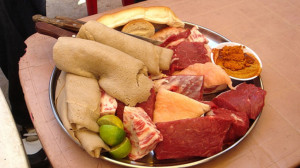Instead of chocolate, Ethiopia marks Orthodox Easter Sunday weeks after the Gregorian calendar celebration, with mass animal slaughter and a meat binge of epic proportions. Goat hides piled up to a metre high line busy city corners while goat heads, ox horns, and entrails overflow from neighborhood bins.
 Revelling in the meat fest is Beza Selemon. Tradition dictates that the 22-year-old accountant should be at home breaking a 56-day vegan fast with her family. Instead she’s in town eating raw minced meat out of her boyfriend Dawit’s hand—a sign of affection in Ethiopian culture.
Revelling in the meat fest is Beza Selemon. Tradition dictates that the 22-year-old accountant should be at home breaking a 56-day vegan fast with her family. Instead she’s in town eating raw minced meat out of her boyfriend Dawit’s hand—a sign of affection in Ethiopian culture.
Beza and Dawit are a new breed of Ethiopians; those from the booming capital Addis Ababa (affectionately known as “Addisynnians”) who are snubbing Easter at home with the family in favour of joining friends at restaurants to enjoy a variety of raw meat dishes.
The aromatic doro wat, a saucy chicken stew, is traditionally eaten to break the fast but the most prized delicacy in Ethiopia is raw meat. It’s fair to say that Ethiopians are flesh obsessed. Ox is the most common meat consumed raw but the more expensive goat is gaining momentum.
Despite official health warnings, Ethiopians still prefer to buy their animals live and slaughter them at home. It’s a sign of respect for visitors and a practice they believe keeps the meat fresh.
Beza and Dawit are celebrating the end of fasting season by eating a highly desirable delicacy called kitfo, a dish consisting of raw minced ox meat.
“When I eat raw meat in the morning, I can go the whole day without eating anything else,” says Dawit. “It has good nutritional value so it makes me feel strong.”
And her friends are not alone. Fast food such as burgers and fries are now voraciously consumed in Ethiopia especially by the younger generations in Addis.
Ethiopia might have been associated with famines over feasts in the past but the country is now the “lion of Africa” enjoying rapid economic growth. Despite this, per capita income remains some of the lowest in the world and nowhere is this contrast more apparent than in the sprawling capital of Addis Ababa, where sub-Saharan Africa’s first metro train network is nearing completion.
As the wealth of the urban population grows, so too does the appetite for raw meat. Some raw meat dishes can cost up to 240birr (£8) per kilo, a price that is out of reach for most Ethiopians. Even for those that can afford it, raw meat dishes are reserved for special occasions.
